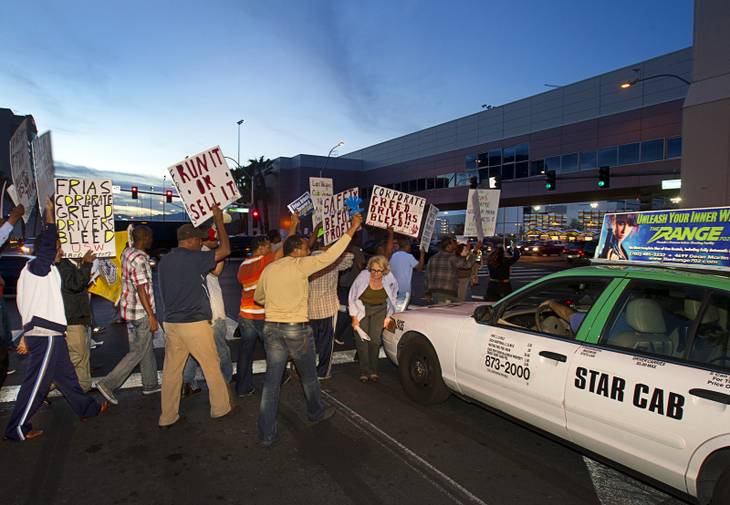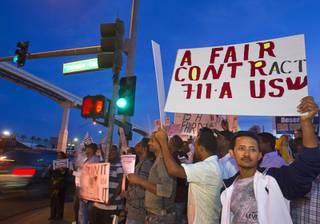For more
Taxi drivers reject labor agreement, authorize strike (Oct. 17, 2012)
Taxicab Authority considers measures in event of strike (Oct. 31, 2012)
The Nevada Taxicab Authority agreed to allow Southern Nevada’s 16 taxi companies to operate up to 30 additional cabs each if unions representing drivers of eight companies stage a strike.
The measure was approved today in an emergency meeting to form a plan to blunt the possible effect of a strike by two unions negotiating contracts with companies that represent more than half the county’s cabs.
Officials estimate that a strike could potentially take 1,300 of the city’s approximately 2,500 cabs off the streets.
The action also gives Taxicab Authority Administrator Charles Harvey the authority to reduce the number of cabs allowed, based on staff evaluations of how many extra cabs are necessary. Authority board members admitted there were too many variables to consider every contingency, including whether both unions strike simultaneously and if some drivers would cross picket lines.
United Steelworkers Local 711-A staged an informational picket at the Las Vegas Convention Center this afternoon as people left the facility on the second day of the massive Specialty Equipment Market Association trade show that’s being attended by an estimated 130,000 people.
The Steelworkers represent about 1,800 Frias Transportation Management group cabbies that drive for ANLV, Virgin Valley, ABC Union, Vegas Western and ACE Cab companies. Frias is the largest cab operator in Southern Nevada.
At issue in contract talks are proposed changes in the company’s seniority policies. The union said 99.5 percent of its members rejected management’s most recent contract proposal and authorized their representatives to call a strike.
The other union, the Industrial Technical Professional Employees, is in contract negotiations with Yellow-Checker-Star, the second-largest cab operation in Southern Nevada, but the company and the union have not disclosed the status of talks.
Whittlesea Blue Cab and Henderson Taxi, companies that are part of the Bell Transportation Group, asked the Taxicab Authority last week to call the emergency meeting, asking regulators to issue temporary licenses to operate more cabs in the event of a strike.
Mark Trafton, a lawyer for Whittlesea Blue and Henderson Taxi, recommended that the five-member authority allow each company to operate 30 additional cabs if a strike is called or to conduct another emergency meeting if a strike occurs.
Most of the other cab company owners — except Frias — agreed with the request.
Frias attorney Neal Tomlinson said the company opposed even having today’s meeting because he said no emergency exists and that the information the authority had was based on “rumor, conjecture and speculation.”
ITPE union attorney Richard Segerblom added that the authority’s decision to consider action could be interpreted as the board siding with cab company management in the contract talks by trying to head off the union’s threatened strike.
Authority Chairwoman Ileana Drobkin rejected both claims, stating that it’s the authority’s responsibility to protect the interests of the riding public and that the loss of more than half the cab fleet would represent an emergency for the city’s tourism industry.
The board initially considered allowing each company to operate up to 60 cabs if a strike was called. Board members amended the motion to reduce the number to 30 apiece and ordered that the extra allocation of cabs would occur 24 hours after a strike is called if the authority board can’t conduct another emergency session.
Under the unanimously approved order, the board would attempt to convene within 24 hours of a called strike and if a meeting could not be set, the allocation of 30 cabs would be allowed, subject to Harvey’s assessment of whether public needs were being met.

